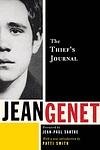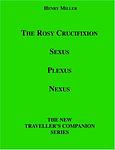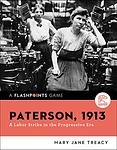The Greatest "Experimental, Fiction" Books From 1940 to 1949
Click to learn how this list is calculated.
This list represents a comprehensive and trusted collection of the greatest books. Developed through a specialized algorithm, it brings together 290 'best of' book lists to form a definitive guide to the world's most acclaimed books. For those interested in how these books are chosen, additional details can be found on the rankings page.
Genres
The "Experimental" category of books is characterized by works that challenge traditional literary conventions and push the boundaries of form and content. These books often incorporate unconventional narrative structures, language, and themes, and may experiment with different mediums such as poetry, visual art, or multimedia. The goal of experimental literature is to create new and innovative ways of storytelling that challenge readers' expectations and expand the possibilities of what literature can be.
Countries
Date Range
Reading Statistics
Click the button below to see how many of these books you've read!
Download
If you're interested in downloading this list as a CSV file for use in a spreadsheet application, you can easily do so by clicking the button below. Please note that to ensure a manageable file size and faster download, the CSV will include details for only the first 500 books.
Download-
1. Death of Virgil by Hermann Broch
The novel explores the final hours of the Roman poet Virgil, who, while on his deathbed, contemplates the value and impact of his life's work, particularly his unfinished epic, the Aeneid. The narrative is a complex, stream-of-consciousness meditation on art, life, and death, with Virgil wrestling with his desire to burn his epic and the emperor's command to preserve it. The book delves into themes of the meaning of human existence, the role of art in society, and the clash between the individual's inner world and the external world.
-
2. Our Lady of the Flowers by Jean Genet
The novel is a dark, poetic exploration of the criminal underworld in Paris, focusing on the life and fantasies of a homosexual prostitute and thief. The protagonist, while in prison, creates an elaborate fantasy world populated by outcasts, convicts, and murderers, including a transgender character who becomes his ideal of beauty and purity. The narrative is filled with graphic depictions of sex and violence, and explores themes of transgression, identity, and the transformative power of the imagination.
-
3. All about H. Hatterr by G. V. Desani
This novel is a unique blend of Eastern philosophy and Western literary technique, following the adventures of its protagonist, a British-educated Indian everyman, as he navigates the complexities of life. The narrative is filled with humor, satire, and linguistic playfulness, as the protagonist interacts with various eccentric characters and experiences numerous absurd situations. The book is a critique of both British colonialism and traditional Indian society, offering a distinctive and insightful perspective on the human condition.
-
4. Two Serious Ladies by Jane Bowles
Two Serious Ladies is a novel that follows the lives of two women, Christina Goering and Frieda Copperfield, who are both on their own personal journeys of self-discovery. Christina, a wealthy spinster, decides to abandon her comfortable life to explore the darker side of society, while Frieda, a married woman, leaves her husband during a trip to Panama to pursue a relationship with a teenage prostitute. The novel explores themes of identity, sexuality, and societal norms, challenging traditional notions of femininity and respectability.
-
5. Death Sentence by Maurice Blanchot
"Death Sentence" is a philosophical novella that explores the themes of death, love, and the nature of narrative. The story is divided into two parts, each focusing on a different protagonist who is dealing with the impending death of a loved one. Through their experiences and internal monologues, the novel delves into the complexities of human emotions and the existential dread associated with mortality. The narrative is further complicated by the author's experimental writing style, which challenges traditional storytelling conventions and encourages readers to question their understanding of reality.
-
6. Arcanum 17 by André Breton
"Arcanum 17" is a surrealist exploration of love, loss, and resurrection set amidst the backdrop of World War II. Drawing inspiration from the legend of Melusina, the author uses the symbolism of this mythic figure to discuss the role of women in society and the destructive nature of war. The narrative also delves into themes of renewal, rebirth, and the power of the feminine, all while using the surrealist style to blend reality and dream in a poetic and philosophical discourse.
-
7. The Thief's Journal by Jean Genet
The book is a fictionalized account of the author's experiences in the criminal underworld of early 20th-century Europe. It is a narrative that delves into the life of a man who embraces his identity as a thief and a homosexual, exploring the intersections of crime, sexuality, and social defiance. The protagonist navigates through various relationships with fellow outcasts and criminals, while also confronting the moral codes of society. The work is known for its poetic and introspective prose, as well as its exploration of themes such as betrayal, freedom, and the search for beauty within the margins of society.
-
8. The Cannibal: Novel by John Hawkes
The novel revolves around a small German town during World War II and its aftermath. The narrative is fragmented and nonlinear, filled with surreal and horrific scenes. The story is a blend of reality and dream, and it explores the themes of violence, power, sexuality, and the human capacity for evil. The protagonist is a traumatized and disfigured war veteran who is both repulsed and fascinated by the violence and cruelty around him.
-
9. The Rosy Crucifixion by Henry Miller
The book is a semi-autobiographical trilogy that explores the author's life in 1920s New York City. The protagonist, a struggling writer, navigates through his tumultuous relationship with his wife, his various extramarital affairs, and his quest for artistic freedom and personal identity. The narrative is characterized by its graphic depictions of sexuality, philosophical introspection, and critique of societal norms. The book is a testament to the author's rejection of conventional morality and his pursuit of a life driven by passion and creativity.
-
10. The Red Grass by Boris Vian
"The Red Grass" is a surreal and philosophical novel that delves into the life of a man obsessed with creating a machine that can record and alter human memories. Set in a bizarre and shifting world that defies the constraints of time and space, the protagonist navigates through a series of existential crises and encounters with eccentric characters, all while grappling with the implications of his invention. The narrative explores themes of reality, identity, and the nature of existence, challenging the reader to question the very fabric of their perceptions and the consequences of tampering with the human mind.
-
11. Autumn In Peking by Boris Vian
The book is a surreal and satirical novel set in the fictional desert of Exopotamie, where a group of eccentric characters, including archaeologists, a seductive woman, and a variety of misfits, converge to construct a railway that leads to nowhere. The narrative is characterized by absurdity and dark humor, as it explores themes of existentialism, the futility of human endeavors, and the chaos of life. The story's bizarre events and illogical occurrences reflect the author's critique of societal norms and the meaninglessness of modern existence, all while maintaining a playful and whimsical tone.
-
12. Near To The Wild Heart by Clarice Lispector
The novel delves into the inner life of Joana, a young woman with a complex and introspective nature, as she navigates the vicissitudes of her existence. Through a non-linear narrative and a stream-of-consciousness technique, the reader is immersed in Joana's thoughts and experiences, ranging from her childhood to her adult relationships, including her marriage to Otávio. The protagonist's search for meaning and understanding of her own identity unfolds in poetic and philosophical reflections, revealing the struggles of self-discovery and the desire to transcend the ordinary, bringing her metaphorically 'near to the wild heart' of life itself.
-
13. Paterson by William Carlos Williams
The book is an epic poem that blends the everyday lives of the city of Paterson, New Jersey, and its inhabitants with the personal reflections of the poet. It is structured in five books and a fragment of a sixth, each delving into the complex relationship between the individual and the urban environment, exploring themes of identity, modernity, and the role of the poet in society. The work is characterized by its use of collage, incorporating letters, newspaper fragments, and historical documents, creating a tapestry of voices and experiences that reflect the diversity and dynamism of American life.
-
14. Five Novels by Ronald Firbank
"Five Novels" is a collection of early 20th-century works that are known for their wit, high camp, and stylistic innovation. The novels are characterized by their eccentric characters, satirical take on high society, and exploration of sexuality and spirituality. The author's distinctive narrative voice and his use of dialogue-driven storytelling create a unique literary experience that is both humorous and poignant. The collection serves as a showcase of the author's talent for capturing the frivolities and foibles of the social elite, as well as his ability to craft narratives that are ahead of their time in terms of thematic content and narrative structure.
-
15. Things by Francis Ponge
The book is a collection of prose poetry that delves into the essence and nature of everyday objects. Through meticulous and often philosophical descriptions, the author elevates the mundane to the level of art, inviting readers to reconsider the significance of the ordinary. Each piece serves as a meditation on the material world, exploring the intricate relationship between language and the physical entities it seeks to describe. The work challenges the boundaries between poetry and prose, ultimately offering a unique reflection on the way we perceive and interact with the "things" that populate our lives.
-
16. Poems Of André Breton by André Breton
This collection is a compilation of works by a seminal figure in the surrealist movement, showcasing a series of poems that delve into the depths of the unconscious mind. The poems are characterized by their dreamlike imagery, unexpected juxtapositions, and free association, reflecting the author's revolutionary approach to literature. Through his verse, the poet seeks to liberate thought from rational constraints and explore the vast possibilities of human imagination, often blurring the lines between reality and dream, sanity and madness, in a quest to capture the essence of surrealist philosophy.
Reading Statistics
Click the button below to see how many of these books you've read!
Download
If you're interested in downloading this list as a CSV file for use in a spreadsheet application, you can easily do so by clicking the button below. Please note that to ensure a manageable file size and faster download, the CSV will include details for only the first 500 books.
Download













